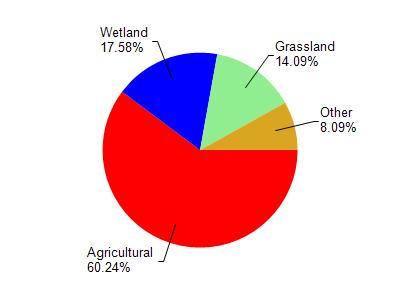Calumet
No
No
Yes
Fish and Aquatic Life
Overview
Stony Brook is a clear, hard water tributary of the South Branch of the Manitowoc River. During the
1970s Fisheries Management implemented a brown trout stocking program to provide a trout fishery in the area. The stream does not support the natural reproduction. A stream survey in the late 1970s
indicated some carryover of trout. A wild trout strain could be stocked with the goal of establishing a self sustaining population if the stream is still capable of supporting a cold water fishery (Meyers 1996). If the stream is not capable of supporting a cold water fishery, the WDNR publication, Wisconsin Trout Streams, should be updated to reflect the correct classification. Intensive agricultural practices has greatly reduced any recreational potential Stony Brook may have once offered.
Date 2001
Author Michael Toneys
Impaired Waters
Stony Brook (mile 0-1.84) was evaluated in the 2022 cycle: phosphorus levels were above listing thresholds as outlined in 2022 WisCALM. This stream was added to the 2022 Impaired Waters List.
Date 2022
Author Ashley Beranek
Impaired Waters
Stony Brook (mile 0-1.84): There is not enough information about this segment of the river to assess the condition of its designated uses.
Stony Brook (mile 1.84-6.23): Assessment results during the 2020 listing cycle show impairment by total phosphorus. Phosphorus levels were too high for aquatic communities (plants, fish, bugs) according to 2020 WisCALM standards. Based on the most updated information, this water was proposed for the impaired waters list in 2020.
Date 2019
Author Ashley Beranek
Condition
Wisconsin has over 84,000 miles of streams, 15,000 lakes and milllions of acres of wetlands. Assessing the condition of this vast amount of water is challenging. The state's water monitoring program uses a media-based, cross-program approach to analyze water condition. An updated monitoring strategy (2015-2020) is now available. Compliance with Clean Water Act fishable, swimmable standards are located in the Executive Summary of Water Condition in 2018. See also the 'monitoring and projects' tab.
Reports
Management Goals
Wisconsin's Water Quality Standards provide qualitative and quantitative goals for waters that are protective of Fishable, Swimmable conditions [Learn more]. Waters that do not meet water quality standards are considered impaired and restoration actions are planned and carried out until the water is once again fishable and swimmable
Management goals can include creation or implementation of a Total Maximum Daily Load analysis, a Nine Key Element Plan, or other restoration work, education and outreach and more. If specific recommendations exist for this water, they will be displayed below online.
Monitoring
Monitoring the condition of a river, stream, or lake includes gathering physical, chemical, biological, and habitat data. Comprehensive studies often gather all these parameters in great detail, while lighter assessment events will involve sampling physical, chemical and biological data such as macroinvertebrates. Aquatic macroinvertebrates and fish communities integrate watershed or catchment condition, providing great insight into overall ecosystem health. Chemical and habitat parameters tell researchers more about human induced problems including contaminated runoff, point source dischargers, or habitat issues that foster or limit the potential of aquatic communities to thrive in a given area. Wisconsin's Water Monitoring Strategy was recenty updated.
Grants and Management Projects
Monitoring Projects
| WBIC | Official Waterbody Name | Station ID | Station Name | Earliest Fieldwork Date | Latest Fieldwork Date | View Station | View Data |
|---|
| 81500 | Stony Brook | 083079 | Stony Brook at Stony Br Rd | 10/10/1996 | 8/17/2019 | Map | Data |
| 81500 | Stony Brook | 10031854 | Stoney Brook at Stoney Brook Rd | 9/7/2010 | 10/8/2019 | Map | Data |
|

Watershed Characteristics
Stony Brook is located in the South Branch Manitowoc River watershed which is 189.10 mi². Land use in the watershed is primarily agricultural (60.30%), wetland (17.60%) and a mix of grassland (14.10%) and other uses (8.10%). This watershed has 228.03 stream miles, 86.31 lake acres and 21,287.68 wetland acres.
Nonpoint Source Characteristics
This watershed is ranked High for runoff impacts on streams, High for runoff impacts on lakes and High for runoff impacts on groundwater and therefore has an overall rank of High. This value can be used in ranking the watershed or individual waterbodies for grant funding under state and county programs.However, all waters are affected by diffuse pollutant sources regardless of initial water quality. Applications for specific runoff projects under state or county grant programs may be pursued. For more information, go to surface water program grants.